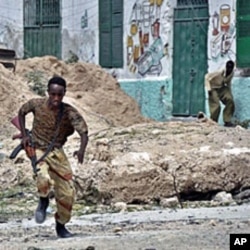In a new report published Thursday Britain-based watchdog Amnesty International says perpetrators of armed conflict in Somalia are not taking enough care to protect civilians. It says people in Mogadishu and other cities are regularly killed due to fighting between armed opposition groups and transitional government forces.
Amnesty says armed opposition groups fire mortars and heavy artillery towards the bases of the Transitional Federal Government, or TFG, and the African Union peacekeeping force, AMISOM. And, the human rights group says the TFG (Transitional Federal Government) and AMISOM (African Union) respond with more mortars and heavy artillery resulting in too many weekly civilian casualties.
Amnesty's Benedicte Goderiaux wrote the report.
"We continue to receive many reports that government and AMISOM forces are not taking the necessary precautions to ensure that their weapons do not affect civilians and civilian residencies," said Goderiaux.
AMISOM has told Amnesty that it does not respond to attacks by armed groups by indiscriminately shelling civilian areas. The TFG has also said it does not approve of the shelling of civilian areas.
Several thousand African Union troops protect the TFG, which right now only controls a small part of the capital Mogadishu.
The United States, European Union countries, and several East African countries have committed to training over 20,000 soldiers and police.
Goderiaux says international support for the TFG should come with more rules.
"We think that the international community should give more support and accountable security. We think the international community should insist more on that instead of just giving support without asking questions," Goderiaux said.
Somalia has been mired in armed conflict since the collapse of the Siad Barre government in 1991.
There were fresh hopes of stability after the appointment of Sheik Sharif Sheik Ahmed as president of the TFG and the withdrawal of Ethiopian troops from the country in January 2009.
But Alexander Ramsbotham, who edits Accord, an international review of peace initiatives published by Britain-based research group Conciliation Resources, says peace is so far elusive.
He says the international community is failing to bring stability to the country.
"Repeatedly over the past two decades, foreign military and state building interventions have failed to build peace in Somalia and I think the latest version of that, with the Transitional Federal Government, is running into similar problems to previous attempts," he said.
He says international policy in Somalia focuses on the problems of piracy and counter-terrorism but does not address local security issues. And he says protecting civilians are not at the top of the agenda.
"Just one example is the mandate of the AMISOM - the African Union Peacekeeping Mission in Somalia - civilian protection is not one of their mandated objectives. So I think that is quite reflexive of the priorities," Ramsbotham added.
The Amnesty report also highlights danger for the media and humanitarian groups in Somalia. It says in 2009 nine journalists and at least ten aid workers were killed.












